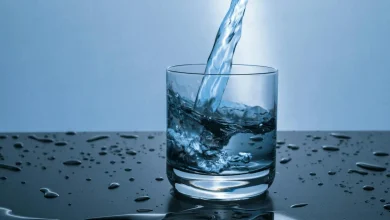The Surprising Impact of Hydration on Sleep Patterns

Did you know that water can help you sleep better? It’s true! The link between hydration and sleep is stronger than you might think. Let’s explore how staying hydrated can improve your sleep and help you feel refreshed.
Water and sleep are both essential for health. In this post, we’ll look at how they work together to keep you feeling your best.
What is Hydration?
Hydration means having enough water in your body. It’s key for many important functions:
- Controlling body temperature
- Helping digest food
- Getting rid of waste
- Keeping skin healthy
Signs You Might Be Dehydrated
Your body sends signals when it needs water. Here are some common signs of dehydration:
- Feeling thirsty
- Dark yellow urine
- Dry mouth
- Headache
- Feeling tired
- Dizziness
How Much Water Should You Drink?
The amount of water you need can vary. Here’s a simple guide:
| Gender | Daily Water Intake |
|---|---|
| Women | About 11.5 cups |
| Men | About 15.5 cups |
Remember, these are general guidelines. Your needs may be different based on your activity level, climate, and overall health.
The Basics of Sleep
Sleep is vital for your health and well-being. Let’s look at how sleep works and why it’s so important.
Sleep Cycles and Stages
Sleep happens in cycles. Each cycle has two main parts:
- Non-REM sleep: This is when your body repairs itself.
- REM sleep: This is when you dream and process information.
These cycles repeat throughout the night, helping your body and mind recover.
Why Quality Sleep Matters
Getting good sleep does wonders for your health. Here are some key benefits:
- Boosts immune system
- Improves memory
- Helps manage weight
- Reduces stress
- Increases productivity
Common Sleep Disruptors
Many things can affect your sleep. Some common issues include:
- Stress
- Noise
- Light
- Temperature
- Dehydration
As you can see, dehydration is on this list. That’s why understanding the link between water and sleep is so important.
The Hydration-Sleep Connection
Your body’s water levels affect how well you sleep. Let’s explore this connection and see how staying hydrated can lead to better rest.
How Dehydration Affects Sleep
When you don’t drink enough water, your body struggles during sleep. Here’s what happens:
- Your mouth and nasal passages get dry
- Your body temperature regulation suffers
- You may experience leg cramps
These issues can wake you up or prevent deep sleep.
Impact on Sleep Quality
Dehydration can make your sleep less restful. You might:
- Take longer to fall asleep
- Wake up more often during the night
- Feel less refreshed in the morning
Good hydration, on the other hand, helps you sleep deeper and longer.
Nighttime Bathroom Trips
It’s a balancing act. You need to:
- Drink enough water to stay hydrated
- Avoid too many nighttime bathroom visits
Finding the right balance is key to uninterrupted sleep.
Optimal Hydration Strategies for Better Sleep
Let’s look at some ways to stay hydrated without disrupting your sleep.
Timing Your Water Intake
When you drink water matters. Here are some tips:
- Drink water regularly throughout the day
- Reduce intake 2-3 hours before bed
- Have a small glass of water before sleep if needed
This approach helps you stay hydrated without frequent night wakings.
Pre-Bedtime Hydration Habits
Here are some do’s and don’ts for evening hydration:
| Do | Don’t |
|---|---|
| Sip water with dinner | Chug large amounts of water at night |
| Have a small glass of water if thirsty | Drink caffeinated beverages late |
| Eat hydrating foods | Consume alcohol close to bedtime |
Hydrating Foods for Better Sleep
Some foods can help you stay hydrated. Try these water-rich options:
- Cucumbers
- Watermelon
- Zucchini
- Tomatoes
- Celery
These foods provide hydration without excess liquid before bed.
Remember, good hydration supports good sleep. By following these strategies, you can improve both your water intake and your sleep quality.
Other Factors Influencing Hydration and Sleep
While water intake is crucial, other factors also affect your hydration and sleep. Let’s explore these:
Exercise and Its Impact
Physical activity influences both hydration and sleep. Here’s how:
- Exercise makes you sweat, increasing your need for water
- Regular exercise can improve sleep quality
- Intense workouts close to bedtime might disrupt sleep
Balance is key. Stay hydrated during workouts and time your exercise wisely for better sleep.
Caffeine and Alcohol Consumption
What you drink affects your hydration and sleep. Consider these points:
- Caffeine can dehydrate you and disrupt sleep if consumed late in the day
- Alcohol may make you feel sleepy but often leads to poor sleep quality
- Both can increase nighttime bathroom trips
Limit these beverages, especially in the evening, for better hydration and sleep.
Environmental Factors
Your surroundings play a role in hydration and sleep:
- Hot, dry environments increase water loss through sweat
- High altitudes can lead to faster dehydration
- Cool, dark rooms promote better sleep
Be aware of your environment and adjust your hydration and sleep habits accordingly.
Tips for Balancing Hydration and Sleep
Now, let’s look at practical ways to maintain good hydration for better sleep.
Creating a Hydration Schedule
A daily plan can help you stay on track. Here’s a sample schedule:
| Time | Action |
|---|---|
| Wake up | Drink a glass of water |
| Breakfast | Have water with your meal |
| Mid-morning | Sip water throughout work or activities |
| Lunch | Drink water with your meal |
| Afternoon | Keep a water bottle handy |
| Dinner | Include water with your evening meal |
| 2 hours before bed | Last larger drink of water |
| Bedtime | Small sip if needed |
Adjust this schedule to fit your lifestyle and needs.
Monitoring Your Hydration Status
Check your hydration levels regularly. Here are simple methods:
- Urine color: Aim for pale yellow
- Skin elasticity: Pinch your skin; it should bounce back quickly
- Thirst levels: Don’t wait until you’re very thirsty to drink
These quick checks can help you maintain good hydration throughout the day.
Improving Sleep Hygiene
Good sleep habits support the benefits of proper hydration. Try these tips:
- Stick to a consistent sleep schedule
- Create a relaxing bedtime routine
- Make your bedroom cool, dark, and quiet
- Limit screen time before bed
- Avoid large meals close to bedtime
Combining these habits with good hydration can significantly improve your sleep quality.
Remember, good hydration and good sleep go hand in hand. By paying attention to both, you’re investing in your overall health and well-being.
Conclusion
Proper hydration is a key ingredient for quality sleep. Let’s recap what we’ve learned:
- Hydration affects your sleep patterns in significant ways
- Dehydration can lead to poor sleep quality and disrupted sleep
- Balanced water intake throughout the day supports better sleep at night
- Other factors like exercise, caffeine, and environment also play a role
By focusing on your hydration habits, you’re taking a big step towards improving your sleep and overall well-being. Remember these key points:
- Drink water regularly throughout the day
- Reduce intake close to bedtime to minimize nighttime wakings
- Pay attention to your body’s hydration signals
- Create a sleep-friendly environment and routine
Small changes can lead to big improvements. Start by implementing one or two of the strategies we’ve discussed. Notice how your sleep quality changes as you fine-tune your hydration habits.
Your body will thank you for the attention to both hydration and sleep. You may find yourself waking up more refreshed, having more energy throughout the day, and generally feeling healthier.
Take action today for better hydration and better sleep. Your journey to improved well-being starts with that next glass of water and restful night’s sleep.



